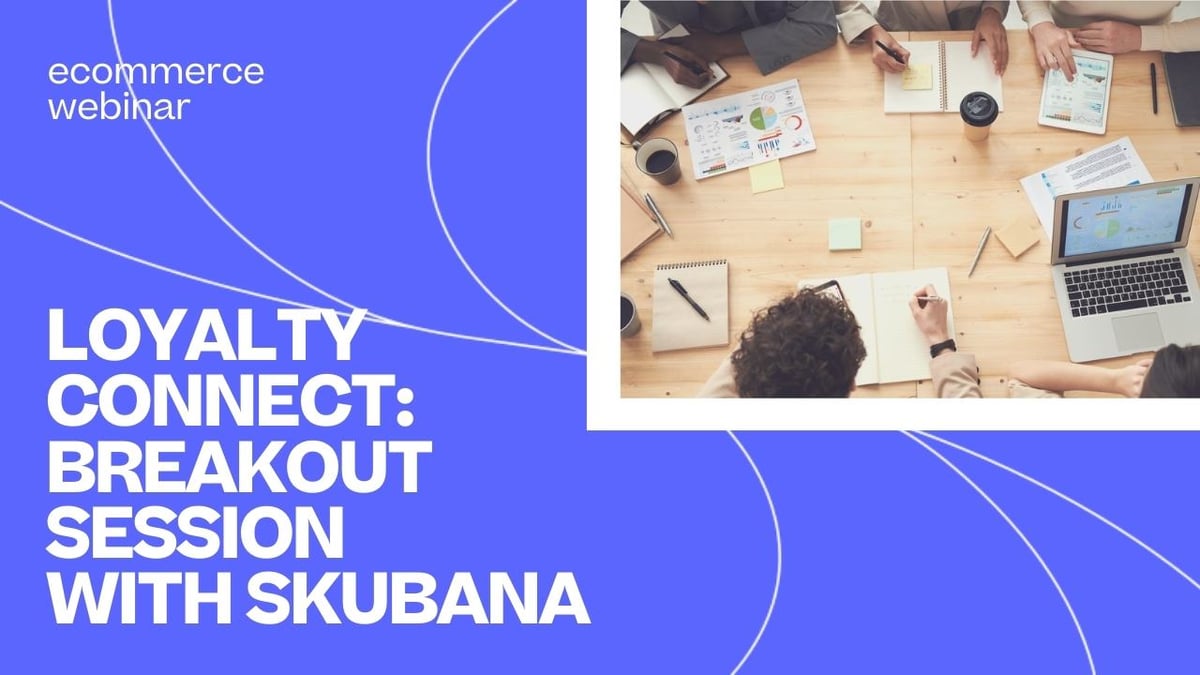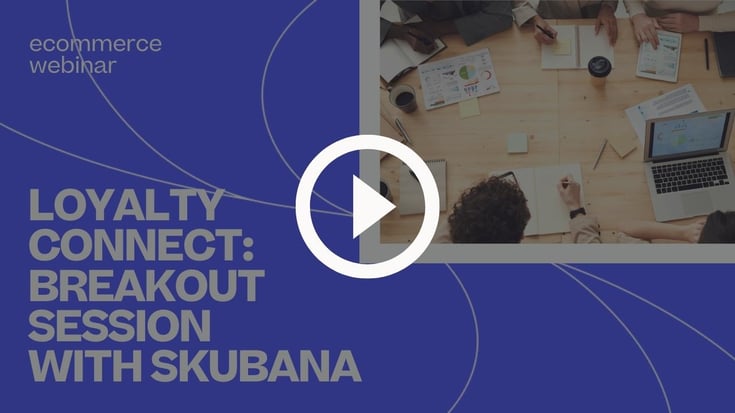On January 27th, 2022, 10+ ecommerce experts came together for the leading customer loyalty conference in ecommerce, Loyalty Connect.
LoyaltyLion sat down with our very own Shannon Sharpe in an up close and personal breakout session.
Transcript
Zachary Priest:
Hey, Shannon.
Shannon Sharpe:
Hi there, how are you doing?
Zachary Priest:
I'm good, how are you? Nice to meet you.
Shannon Sharpe:
Nice to meet you as well.
Zachary Priest:
Yeah, you're looking forward to a little bit of a breakout session?
Shannon Sharpe:
Yeah, absolutely, happy to be here.
Zachary Priest:
Oh, that's really, really good. I mean, we'll hopefully have some people coming in after the session on the main stage finishes, which be good and hopefully have some people come in, have a chat to us. And I mean, as far as how we wanna do it, you guys sent through some seeding questions, which was really good. Hopefully a few people will be in here and ask some questions too, but I really wanted to just give you the opportunity to talk a little bit about Skubana. We can use those seeding questions to have a chat about Extensiv and I'd love for you to introduce yourself and talk a little bit about Extensiv at the start if that's cool.
Shannon Sharpe:
Okay, yeah, sure. That sounds good.
Zachary Priest:
Nice one, yeah, hopefully some people will join and switch their cameras on and kind of get involved. We don't know necessarily what the appetite will be to that, it's kind of early in the conference today. Hopefully we get to chat but you never know and in the end it's being recorded anyway, so, you know, it's well worth covering everything off anyway. Have you had a nice start to the day? What time is it where you are?
Shannon Sharpe:
It's just 9:30 in the morning so not too far into the day so yeah.
Zachary Priest:
Sure, nice one, nice one. I was having a look at your LinkedIn of course beforehand, It was a lot of horse training stuff.
Shannon Sharpe:
Oh, yeah.
Zachary Priest:
That's super interesting.
Shannon Sharpe:
Yeah, it's really cold here right now. So, I was out breaking ice this morning. We're at, gosh, I don't know, maybe nine degrees right now and so yeah, it's cold. So, always fun, hopefully we're gonna get back into normal temperatures here soon.
Zachary Priest:
Yeah, I mean, that's the thing. I almost freak out what normal temperatures are like in the winter. I'm from Melbourne Australia originally so I've been in London for that.
Shannon Sharpe:
Oh yeah. 
Zachary Priest:
Yeah, so I've been in London for about seven years and the winters don't ever get any easier, you know, they are still like, "Oh my goodness, why is it so dark all day?"
Shannon Sharpe:
Yes.
Zachary Priest:
And like how could it be? I can't even remember leaving work with the sun up. I forgotten what that is like. And then when it rolls back around again, I'm like, "Oh, this is a dream. How could I ever leave when it was dark?"
Shannon Sharpe:
I know. Yeah, winter solstice is like my favorite day. I'm like, "Okay, we get more sun now."
Zachary Priest:
Yeah, it's only up from here, right?
Shannon Sharpe:
Yeah.
Zachary Priest:
Incredible, yeah. It is so like that. It's funny, it does make me, like, there is a coziness to it though that I feel like I never got, you know, earlier in my life, like the kind of like, "What is all this?" Even like Christmas music, I was like, what are all the, like all these Carol around like being cozy and all that kinda stuff. And then I moved to Europe and I was like, "Oh, I get it now, this all makes sense."
Shannon Sharpe:
Yeah.
Zachary Priest:
You know? Yeah, that's hilarious, it's hilarious. Have you, did you have a chance to tune into the sessions before this one or the main stage?
Shannon Sharpe:
Unfortunately I did not. I was planning on it, but I, I had some things come up that I wasn't able to do it, so unfortunately, yeah.
Zachary Priest:
Yeah, yeah, no worries at all, no worries at all. Gonna give us a couple of minutes to have them finish up on the main stage and then we can go from there. I think we have, we've got some people coming in now. So welcome to the people who are coming in. We're just gonna give it one, two more minutes. I'm Zach from loyalty line. I'm a marketing ops lead here and we have Shannon Sharp from Extensiv as well. Who do you wanna give us a little bit about you Shannon?
Shannon Sharpe:
Sure, I'm Shannon with Skubana, I'm an account executive with the team and just represent the sales team essentially. And Extensiv is an operations platform that helps with omnichannel sellers expand across multichannel, multi fulfillment platforms to just kind of expand across the market and keep their inventory managed and things like that. So, nice to meet you guys.
Zachary Priest:
Yeah, thank you so much for taking the time to jump on this, in this breakout session today. To everybody who's watching, feel free, you know, we've got up to 20 slots as well for people to turn their cameras on, turn your audio on. If you wanna jump in and jump into more of a conversation or if you are not quite ready to turn the camera on, I know it's early in some places, so feel free to just pop some messages in the chat or you can use the Q and A function as well. Keep an eye on those as well. So if anything comes up there, but I thought just to kick us off Shannon, maybe we could have a quick chat just to kind of follow along from the conversation that was having on the main stage. Could you tell us a little bit about how Extensiv solves, you know, the really common challenges that brands who struggle with omnichannel, especially around inventory management, data management, across different channels. How does Extensiv help with that?
Shannon Sharpe:
So essentially our goal is really unify, you know, across your channels. So basically one single source of truth for your order management supply chain, you know, back office operations. So basically we are like the data source of truth inventory and everything of that nature. Really essentially to automate and grow your business essentially today, especially with supply chain issues and things of that nature. We really want to make sure that everything is accurate and that, you know, kind of where to go for that source of truth so that you can keep growing the business, but also the accurate for customer feedback and things like that. So that's really kind of what it is. So we're multichannel, multi fulfillment and then we specialize really in order management and then the, you know, the purchase order piece of the business. So, you know, we don't want over ordering or under ordering for the company so that they can continue to scale. So kind of all of that goes back to like customer satisfaction in that space, as well as like keeping that business scaling.
Zachary Priest:
Sure, thank you. I mean, what, what kind of going along that single point of truth idea, being a marketing up sky myself, like whenever I hear single point of truth, I'm like, "Yes, more of that please." Like, I just wanna be able to go to one place, especially if I'm, you know, I've got omnichannel marketing campaigns, omnichannel fulfillment, I'm selling through multiple places, but my customers don't think of, or merchants customers, don't think of it that way, right? They think of the brand and the merchant and they expect the merchant to have all of the information, regardless of what channel that as a customer they're walking through. You know, there's nothing worse as a customer being like, "Well, I interacted over here in this channel and then yeah, three months later I've come through a different channel, but it seems like those two experiences aren't necessarily connected or you don't have my order, even though I know I came through a different channel, but you must have that history somewhere or you must know who I am. And I've given you information." Do you see these kinds of challenges coming up all the time for prospective customers or merchants that you work with?
Shannon Sharpe:
Yes, I do. I think that, you know, mainly it's like related to outta stock issues where, you know, they're overselling or they're not performing to the level that they need to be for their clients. So really, I don't think, I think on the reverse side of the issue is because supply chain demands are so strong right now, clients, their customers aren't not willing to wait for products. And as long as they know, you know, when it's gonna come, as far as like the communication between client customer, we're good, right? So, as long as we can, as long as we know the feedback to the customer, when we have that communication, we're fine. So as long as like Extensiv can kind of say, "Hey, yeah, that order's is sitting at three PLAVC, that order sitting on our warehouse, you know, whatever. But yes, to your point, we do hear that a lot. And like with the tools that we can have in place. So the tech stack approach and best in breed tech stack approach. Then as long as we can communicate that to the customers, our brands, customers, then, then we're good to go.
Zachary Priest:
Yeah, it's a funny situation that we find ourselves in, right. That as merchants and customers, the table stakes are a little bit higher now for all eCommerce merchants. There's an expectation having gone through, well, still going through a pandemic, but a lot of brands going D to C and way more customers coming align into eCommerce, their expectation from every merchant is pretty much like, "Well, I expect to know exactly where my order is down to the three meters squared or three feet squared, essentially, like I wanna know it's arriving right away, I wanna know where it is, I want to be able to track everything about it, I want a really seamless experience across channels, and I wanna be able to get it now." And now we're faced with, well, just recently and probably for a little bit further, we've got supply chain issues globally. And so we've got brands who have that there's intent in the market from their customers, but they're not able to fulfill that. We've got a question in the chat here, "How have you seen retailers adapting to the shipping and fulfillment challenges of the last year or even the last few months, especially over, you know, black Friday or cyber Monday into Christmas and now in the new year."
Shannon Sharpe:
That's a great question. So really there have been some amazing tools developed that have partnered again with our platform, specifically for supply chain. Communicating with the vendors to then be able to communicate with the customers and, you know, really just be transparent. I think that's the biggest thing right now is just transparency. As long as we have feedback and there's a good feedback loop and everybody's communicating with everybody, then we're good to go. I think people have to understand patients and in this kind of new world that we're living in. But everything still has to be fast and clean and crisp, right? So it's like kind of an oxymoron, but we're still doing the best we can, you know?
Zachary Priest:
Yeah, you want to transparently be able to tell your customers that everything is great and fine, but then there are some circumstances where, I mean, is it, I know merchants that that will be difficult for them though. Sometimes to be transparent. Is it about the timing of that transparency? Is it making sure that all the information that's kind of there, should you make more information available to your customers then in those circumstances?
Shannon Sharpe:
I think as much as possible for sure. And if it's gonna take, you know, and that way, I think the, again, the long and short of that is as long as the client knows how long it's gonna take or what not, then they can make a decision, right? Maybe they don't wanna wait for an extended period of time to receive their item. You know, maybe they do. But as long as they know, then they're good to go. And then again, the other piece of that to Molly's question is really that retail, you know, locations have shut down. Everybody's obviously moving more towards the econ model, but now coming back into 2022, we've got a lot of people going back to some retail locations and the mixed model again. So we're starting to go back to a little bit of a mixed model back to the, you know, the omnichannel back to, you know, we're opening up some more POS and some E-Comics and some more wholesale presence. And so that adds a little bit of a layer of complexity as well. So as we start thinking about that, that's very important to have these tech stack approaches for the customer feedback loop again.
Zachary Priest:
Sure, and have you got some, or can you think of any, but I'm sure you've got heaps of good examples, but how does implementing something like Extensiv and kind of at what stage would you do it? How does implementing something like Extensiv help merchants make sure that they are giving the best information possible to the customers across, especially as you said, you've got most channel omnichannel, we're going back into, you know, high street or shopping center retail. How can Extensiv use that information and make sure that transfer information is available to everybody throughout the organization and use is that to help build customer loyalty and retention?
Shannon Sharpe:
Well, so kind of going back to that central source of truth for, you know, inventory management, forecasting, demand planning, things like, you know, if they know, you know, their inventory, you know, just like all in one place, then they, there's like, you know, just more transparency inside the organization so that they can stay lean, they can stay agile and then they can, you know, make good decisions within the business. So that, you know, whatever needs to be done as far as, you know, as far as like expanding their presence and then they are good to go. But, they're gonna be able to accurately meet the needs of the customer better because they have that single source of truth. So, as far as implementing a solution, I just I've seen over the years, just people waiting way too long and then there's problems. So, it's much harder, harder situations to implement as a solution when you have problems versus when you don't. So I'm always of the school of thought. If you're gonna start a business and you need a solution in place, get the one that's gonna scale with you because re-platforming is way harder and way more expensive than just getting the solution that's gonna scale with you. I've seen it happen too many times, and I've also seen one, you know, situations where people will get a solution that's way too robust for them and they never go live. So, it's always just hard to have like the right solution that's gonna scale, stick with you for a while, and then, you know, maybe you scale beyond that, but you have to just kind of make a really good choice for what exactly, you know, fits needs at the time that's that's appropriate. But, I would say the sooner, the better to get a solution in place.
Zachary Priest:
Yeah, I think that's a great point because the amount of, I mean, especially in the last couple of years, and it can be a bit of a double edged sword too. We've seen some merchants go surprising. We have surprising explosive growth. You know, some you product, I hope it happens to anybody who's listening who's a merchant. I hope it happens to you next week. You know, that you have that product or that experience that goes viral. But, you know, it just takes one influencer or a one great piece of PR or something like that and suddenly a product is the hot, like it's the hot ticket. Everybody wants it. And when your tech stack and your automations don't scale with that kind of demand mixed with, as you were mentioning, things like understanding what you are, being able to forecast, some of that demand, being able to understand how much product you have available at any one time. You don't also wanna be getting sudden huge demands as well for products that you might not have in your pipeline, or that you might only be able to facilitate a little bit of time. So, do you think it does make sense then to when I'm looking at my own business and trying to decide on where I can automate where I can make improvements with my, you know, auto fulfillment and in my tech stack. What should I be looking at? Should I be looking at kind of like my busiest periods times 10 or like, something like that?
Shannon Sharpe:
Yeah, that's a good thing to think about. You know, I think there's lots of ways to look at it. You know, I think it's kind of like, what is the future plan for the business? You know, what do you hope to, to be at year two? I mean, even where do you wanna be in six months from now? But E-commerce is weird. I mean, I've seen businesses like in 30 days hit a boom that they weren't expecting and they weren't prepared. So it's just, I think if you have a business in E-commerce you need a solution. I mean, that's just my 100% opinion on it. And, you know, know most of these solutions, like even Skubana, it's not cost prohibitive. It really isn't. For a business that's gonna go multi-channel and multi fulfillment strategy, even multi-channel, it's really not cost prohibitive to get in place. But there's lots of great solutions out there. And the great thing about our industry is that most of the great people in our industry will recommend another solution. So if you come to, you know, a sales rep, you know, we're really consultive and we take that approach into it. And so it's one of those things where it's like, "Hey, you know what? I don't think this is the right one for you. Let's walk through a process, let's talk about what you need." And it might not be this particular solution, but there's lots of great solutions out there that might hit a price point that would help them scale in that direction. So that being said, there's always gonna be something that fits the need.
Zachary Priest:
Yeah, and you really, I mean, we hit that for solutions, not just in water fulfillment, stock management, yeah that kind of thing. It's kind of everything to do with your own business, knowing your own business really well is so key to this and, you know, working with any agency app, whatever, they should help you learn a little bit more about your own business and a little bit more about your customers in order to help you pick the right solution. On that note then, about thinking about your own business or thinking about your own processes, who in the business, or who in my business should take responsibility for how we best fulfill orders, how we best work with our customer based so that they understand what information's available and how to keep them loyal.
Shannon Sharpe:
I'm sorry, could you clarify that question?
Zachary Priest:
Sure, yeah, so who who's the best people or who in my business should be looking after how we best fulfill orders? Like who should take responsibility for order fulfillment within my business?
Shannon Sharpe:
Like in the brand business, you mean?
Zachary Priest:
No, I mean as a merchant, for example, so obviously there is like the operations fulfillment side, but there is more to the communication of that information to the customer and to the market. There's kind of, to me at least, it seems like there's a bit of mixed responsibility. There's obviously the executional work and you're working with couriers and third party logistics and all that kind of stuff. And your tech stack might be doing some of the work. But what if let's say, if something doesn't go as perfectly well with an order, whose responsibility is it then to, you know, work that through with the client or the customer or fix that, that issue if there is one.
Shannon Sharpe:
I guess, you know, I deal with so many different types of businesses. You know, from pre-launch all the way to, you know, really large groups of, you know, groups. So, I think that it just depends on the brand or the business, right? So it could be the CEO that's dealing with that. It could be client services, you know, but I think it just depends on the structure of the business. But I guess to the point at that, when you're dealing with clients, I think that everybody needs to take responsibility and whatever it takes, make sure that that client is satisfied. That's what it takes to make sure that that client's satisfied. That would be like the best answer on that one.
Zachary Priest:
No, I like that a lot, the responsibility falls through everybody who, you know, who has a touch point, who has responsibility to help fulfill that order and fulfill that brand experience as well. And this is what you were saying before around having really good data across all of your channels and having that single point of truth. Because if you have somebody who's on your online chat talking to a customer who has a concern or somebody else who calls or hits you up on social media, that's probably all three or four different people, right? So one of them is gonna be customer service, one might be managing, it might just be the peak marketing officer who's had a message on Twitter or on Instagram, for example. You need those people to be able to go and get the right information right away, too. I have another question here. Someone's a bit nervous about expanding the market that they sell to. Do you have any recommendations, does Extensiv have any recommendations on how to think about expansion and what kind of roadblocks or traps they should be watching out for when they're expanding?
Shannon Sharpe:
Definitely again, back to having a tool in place. And yeah, I think, you know, a lot of times people think about doing this in phase approaches, but again, I go back to always just having the proper tools in place. So like, as you think about like, you know, when you, like if you don't, you have, you know, these booms on like Amazon or you go to marketplace and it, you didn't have something in place. But, you know, with things like, you know, having an inventory management tool in place, having the proper demand and planning strategy behind you, you're, you know, you're putting yourself in a really good place for the, you know, that expansion. So, you know, you can have things like buffers to the channels and, you know, protection of from over sales and out of stocks and things like that. And just strategies behind you. But I also think really I'm gonna have a good team behind you because we have, you know, like it's not just about having the tools in place, it's having a good client services team behind you with those tools in place. And a lot of there are solutions there are really great solutions that don't have good customer service. That's very important. In fact, I just went through this with my mother. She was implementing a new solution for her business and the client services team was not that great. So I was having to help her and I was like, I don't even know this tool, you know, but I was like, you know, I pride our team in having great client services because when my clients that I, you know, walk through the process of coming on to Skubana, they go into this amazing onboarding experience. And I'm very happy because the feedback loop is so good. But, you know, if you don't have that, when you go live with a new strategy and you don't have the support of the team behind you for questions on, "Oh my gosh, I don't know if this is gonna be a good idea, or how do I plan for this?" That's a little troublesome.
Zachary Priest:
Yeah, of course.
Shannon Sharpe:
So that would be my suggestion too.
Zachary Priest:
Yeah, so making sure that the people who have the tools are empowered to use them, but also making sure that the people who are using them is trained up and is positive and is brought into the brand and know what good customer service or good experiences look like. I mean, you touched on Skubana's onboarding there. I'd love to know a little bit more. Is there anything you could tell me more about that onboarding experience and what makes it, you know, how does Extensiv onboard their merchants. It's a complicated, not to say Extensiv is a complicated solution, but it can sometimes be, I'm sure to some merchants, a part of their business that they either don't know a lot about or doesn't come naturally to them. So, could you tell me a little bit about how Extensiv helps new businesses on board, Extensiv itself?
Shannon Sharpe:
Sure, so we have a really thorough evaluation process So during the sales cycle, we will evaluate Extensiv with them in a very consultative approach. So it's more or less kind of walking the client through that evaluation process, right? Cause we don't know if it's gonna work either and we don't take the approach that we do. So, basically it's kind of going through a demo but then also like a work workflow review to get them to the point where if it makes sense, then we move forward. But after that workflow review, excuse me, then the notes that have been taken from all the stages of evaluation, as long as that might take, will be handed off to their implementation manager. And then the implementation manager will create a plan for them moving forward. And that being said, implementation with Extensiv is about four to six weeks, could take a little bit longer, but it's really not that extensive of a timeframe in terms of software.
Zachary Priest:
Yeah, yeah.
Shannon Sharpe:
But as far as, yeah, I mean, four to six weeks. You know, I've seen things go for other solutions like way longer, but our team is pretty diligent in terms of trying to kind of keep it condensed, but also really thorough. But then after implementation, they have account management following them along to make sure that they have a point of contact. We have client services and we're always, you know, really tweaking that process to make sure that our clients are very, very well attended to, because, you know, it's important in this industry to have a point of contact. It's important to have, you know, someone that you can call. So we have a really good customer service in terms of email chat and phone support, but then, you know, that point of contact.
Zachary Priest:
Yeah. I mean, I'm always impressed in anything. If I can assess a problem and be able to make a change in a quarter or less, if there's no reason to not go and do that, then. You mentioned actually at the start of the call, that you in the middle of this session, actually, the customers moving back into offline channels again, and merchants probably having to, you know, some merchants, it might be the first time that they might have started online and now they're thinking about offline. Have you got any tips for how, how merchants can connect their online and offline experience together and make sure it's really good for customers?
Shannon Sharpe:
Yeah, I think, you know, for majority just having a good point of sale that connects if they wanna share the inventory, right. But I think like in this day and age, like you're gonna have to, because the supply chain making sure your inventory management is talking well with your point of sale system and everything is kind of like communicating well and getting a good strategy in place. Because I think sometimes people don't realize that has to communicate and needs to be structured well. Sometimes people don't want like maybe the sale to communicate through inventory management solution and they want it to communicate in a certain way that maybe wouldn't be recommended by like a best practice, right? So when our, I think when teams are recommending best practices, I think people need to be a little bit more cognizant or like aware and listen to those recommendations so that it can kind of flow a little bit better.
Zachary Priest:
Sure. well, I mean, you mentioned good strategy. I mean, I'm the same, you know, I love a good strategy, but as we said, we were talking, we were saying before about that shared responsibility of a good, you know, pre, during and post purchase experience. Who would, let's say just a mid, a mid-sized business, where should that strategy be coming from? Should it be coming cross departmental or might it just be, should an E-commerce manager be looking after it or do you expect a lot of, should it be a real cross team effort on these kinds of offline, online strategies?
Shannon Sharpe:
I think it probably should be a cross team effort. I think that, you know, having some input from the team it's always great to have. Now, you know, people can dive in and out of the conversations, throw their input in and have maybe like a main evaluator. That's always a great way to go but that way they can pull all the information together and then we can, you know, create a statement of work from there. But it's always helpful to have a lot of input but have that one key player that's pulling it all together.
Zachary Priest:
Yeah, yeah I agree, I agree. You've gotta have that someone who's gonna be like, "All right, we need to make a decision here or we need some consensus, have that consensus builder." Last one, as we've just got a message saying that it's almost time to go back to the main stage. We're running outta time and we're working through some of these questions. It's been really good. I wanted to maybe finish on the joining up of Extensiv and loyalty lion had me quite interested in the loyalty side of things, but, could you give us a summary of how you see Extensiv increasing customer loyalty and retention?
Shannon Sharpe:
I think just accuracy of information, you know, the more, again, going back to data integrity, being agile and, you know, as long as you have, you know, what you need to be on point with the business and have that data source of truth, the better you're off you're gonna be able to serve your customers and keep them happy.
Zachary Priest:
Yeah, of course. I mean, that's, as we said right at the beginning, as long as customers know what's happening or you're enabling your staff to be able to communicate that to your customer's perspective. New returning, whatever it is, then I'm sure that they'll be able to make better decisions and feel they are working with a nice, honest, genuine brand, right? Is there anything else you had on your mind, you know, we've been talking about opt out first party data, those kinds of things. Is there anything that you'd like to touch on or let the listeners, the audience, attendees, people who might be watching this in the future on a recording? What kind of stuff is on your mind recently?
Shannon Sharpe:
I think it's, I just, lastly, I would just like to say, I think it's been amazing watching through the last couple years, how brands have been able to utilize this opportunity to continue to just service their customers, right? Like, because E-commerce has just been amazing in this transition with all that's been going on. So, just taking that opportunity to be in, you know, the industry that we are in and really be able to continue to do what we do. It's been really awesome to help clients expand their brands and do it well. We are just lucky to be in this business.
Zachary Priest:
Yeah. I love that. The nice positive message was to finish on, right. That it's an innovative space that's moving quickly. We can learn new stuff every day. That's really good. Is there anything you'd like to live us with about Extensiv maybe how, what kinds of challenges people might be coming up against that would give them reason to come and have a chat to you and how they can get the best ways to get in touch with you as well?
Shannon Sharpe:
Sure, absolutely. So if, I mean, if there's any kind of issues with inventory management, demand planning or forecasting, connectivity to different warehouses, anything like that. You know, give us a call and simple is that shannon@skubana.com is my email and feel free to contact.
Zachary Priest:
Amazing, thank you so much, Shannon. It's been a real pleasure speaking with you and thank you everybody for jumping in this breakout session. I hope you all hang around, jump back to the main stage for our next session, which our next panel actually, which is gonna be really, really awesome. Connecting to convert, I think is next. I'm just jumping around my own screen, trying to find it. So have a lovely rest of the day, everybody. Shannon, I hope you have a chance to catch some more panels soon and we'll speak to you again really soon.
Shannon Sharpe:
Thanks Zach.
Zachary Priest:
Cheer, Bye.







